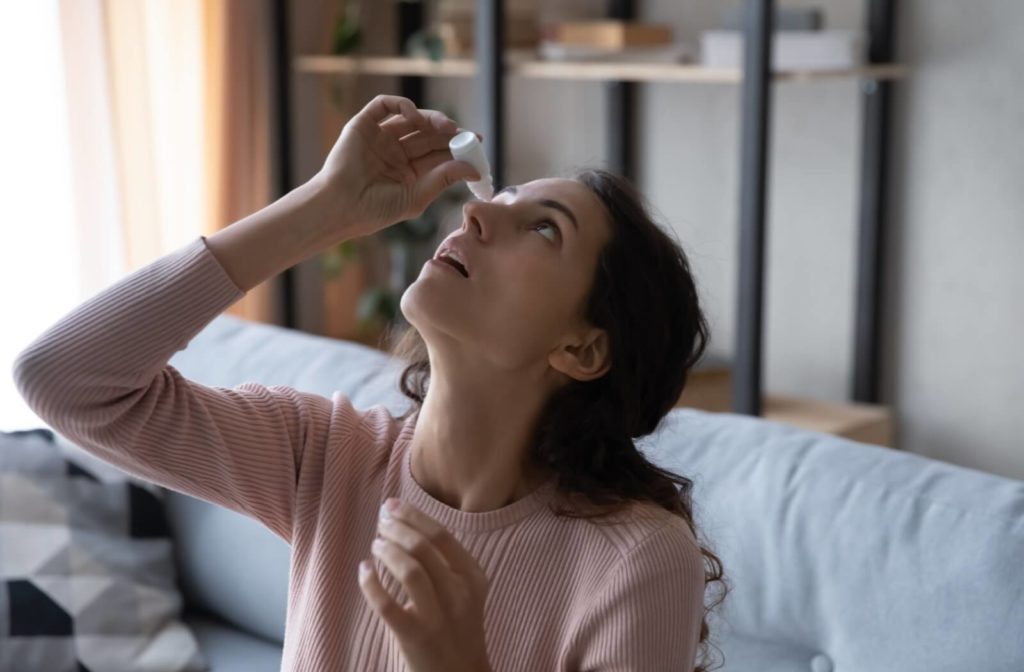Eye drops are easily found in most pharmacies and medicine cabinets. They’re an excellent way to find relief from many things, including dry eye disease and allergic reactions. But how often do you check the expiration date? What happens if you use expired eye drops?
Eye drops are designed for medicinal use, and they do expire. If you use expired eye drops, you’re significantly increasing your risk of infection, irritation, and even long-term vision damage. Instead of using expired eye drops, dispose of them properly and purchase a new bottle; this helps prevent potential eye problems further down the line.
Contact your eye doctor at Richmond Vision Care if you’re unsure whether or not your eye drops are expired. We’re here to help!
What Are Eye Drops, Exactly?
Eye drops, also often called artificial tears, are a special type of medicinal liquid with a range of benefits. They’re inserted directly into the eye or on the eyelid to help you find relief from certain problems. There are several different types, each designed to address a unique situation.
Dilation Drops
Dilation drops, often using an atropine concentration, help dilate the pupils. Because of this, they are often used in eye exams. These drops help dilate or expand your pupil, allowing more light to enter the eye. This makes it easier for an optometrist to see inside your eye.
However, these are rarely recommended for everyday use, though they are sometimes recommended for their benefits to other forms of myopia control.
Redness-Relief Drops
Redness-relief drops from a special decongestant called tetrahydrozoline are designed to help with visible redness or bloodshot eyes. They’re particularly helpful for redness caused by:
- Dry eyes
- Allergies
- Smoke
- Smog
- Pollution
These drops contain vasodilators and vasoconstrictors that either shrink or dilate the blood vessels, lessening the redness.
Drops for Dry Eye
When you have dry eyes, your tears can no longer do their job. When this occurs, your optometrist may recommend artificial tears. These help supplement the work your tears need to do while helping you find relief.
Antibiotic Drops
Antibiotic eye drops are typically recommended for eye-related infections and inflammation. They’re often recommended for conjunctivitis, or pink eye, to help reduce swelling and irritation while treating the bacterial cause.
Steroid Drops
If you have a severe allergic reaction or infection where inflammation is a significant problem, your optometrist may recommend corticosteroid eye drops. These help you find relief while targeting the root cause of your eye problem.
How Often Should You Use Eye Drops?
When an eye care professional advises using eye drops, it’s essential to follow their advice. Some drops are recommended to be used once a day, while others can be used wherever needed to find relief.
For instance, steroid eye drops often start with a higher dose before weaning down over time. Conversely, certain drops can be used whenever necessary.
Always follow the advice of your eye care professional. If you’re unsure, read the bottle; they often include a recommended schedule. You can always reach out to your optometrist for advice if you’re unsure of what to do.
Do Eye Drops Expire?
It is extremely important to note that eye drops do expire. On the product label, typically on the box and the bottle, you’ll see the month and year indicating the last date they will be usable. While the bottle doesn’t immediately become toxic the second this date passes, it can help to treat it as such; expired eye drops can pose significant risks.
If your eye drops expire, dispose of them as soon as possible. Rather than using expired drops, replace them—this can potentially reduce the risk of further problems in the future.
The Risk of Using Expired Eye Drops
Though it may not seem like a serious problem, expired eye drops can pose a wide range of complications. The exact outcome depends greatly on a few factors, including:
- Your immune system
- The specific ingredients in the drops
- How far it is past the expiration date
The problems get significantly more likely the further past the date you are. Using expired eye drops can lead to the following:
- Allergic reactions
- Bacterial infections
- Fungal infections or spore growth
- Corneal abrasions (especially if you’re using numbing drops)
Expired eye drops are often significantly less effective than their in-date counterparts. So, if your eye drops are expired, replace them; the risk of significant eye damage isn’t worth it.

The Importance of Proper Eye Care
When it comes to taking care of your eye health, don’t cut corners. Instead, come visit our team at Total Vision in San Francisco. Whether you’re looking to book an eye exam, try out contact lenses, or replace an expired bottle of eye drops, our team is here to help. Book an appointment with us, and let’s work together to keep your eyes safe and sound.


